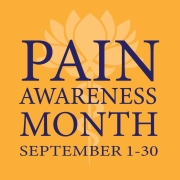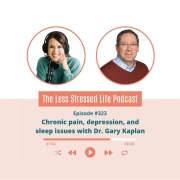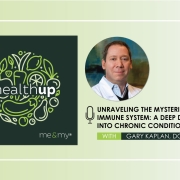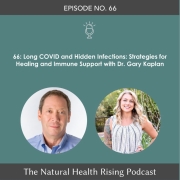With the right treatment, people seeking relief from depression or anxiety can live happy, productive lives. But if you’re one of the many Americans seeking relief from depression or anxiety, you’re no doubt aware of just how elusive successful treatment can be. It is estimated that as many as 30% of depressed patients do not respond to treatment, raising an important question: could it be that we’re thinking about — and therefore treating — these conditions in the wrong way?
A growing body of research suggests that depression and anxiety might not be mental disorders in and of themselves, but rather symptoms of a physical inflammation stemming from increased microglial activity in the brain. Microglia are the immune cells of the Central Nervous System (CNS) and are responsible for producing inflammatory chemicals in response to infection or other CNS damage.
This gives the medical community and those living with these debilitating conditions new hope. In thinking about depression and anxiety as symptoms, we’re afforded new insights into potential root causes, as well as alternative methods of treatment.
Here are eight often-overlooked causes of depression and anxiety that you should consider:
1. Celiac disease or gluten intolerance.
About 1% of Americans have celiac disease, an autoimmune disorder caused by the body’s negative reaction to gluten, the protein found in wheat, barley and rye. And gluten intolerance — also called non-celiac gluten sensitivity — is estimated to impact six times as many Americans.
While we don’t yet understand the mechanism of gluten intolerance in the body, the impact can be very similar to that seen with celiac disease. While intestinal complaints are most common, research is showing that some people with these conditions may, in fact, present with anxiety and depression as the only symptoms.
You can test for celiac disease with a simple blood test. The only way to test for gluten intolerance is to go gluten-free for six weeks and watch for any improvement. (Before making any major dietary changes, make sure to consult your provider or a registered dietitian.)
2. Sleep apnea.
There are two types of sleep apnea. Obstructive sleep apnea is the more common form and occurs when the soft tissue in the back of the throat collapses, thereby blocking the airway during sleep. Central sleep apnea, although not as common, is a result of the brain forgetting to tell the body to breathe. Studies confirm the relationship between sleep apnea and depression.
If you get plenty of sleep but never feel quite rested, or you find yourself often nodding off, a first step you can take is to answer the 8 questions on the Epworth Sleepiness Scale. If your score is equal to or higher than 10, the results should be discussed with your provider.
3. Lyme disease.
Lyme and other tick-borne diseases are becoming increasingly prevalent. While the most common symptom is joint pain, these diseases can also be associated with depression and anxiety disorders (affective disorders).
This link between Lyme disease and neuropsychiatric disease was first documented in 1994 in the American Journal of Psychiatry and has been widely documented since, but the potential connection is frequently overlooked when diagnosing those with psychiatric illness. If you are suffering from chronic pain and a mental disorder, this diagnosis should be considered.
4. Unhealthy diet.
A study published in PNAS (Proceedings of the National Academy of Sciences of the United States of America) confirmed that “…frequent fried food consumption is strongly associated with a higher risk of anxiety and depression.”
On the other hand, eating a diet high in omega-3 fatty acids (fish oils, walnuts, and flaxseed) and antioxidants (colorful fruits, berries, and greens including spinach, broccoli, and collards) can help provide the brain with the nutrients it needs to repair free radical damage and optimize function.
5. Thyroid disease.
Both an under-functioning thyroid (hypothyroidism) and an over-functioning thyroid (hyperthyroidism) can present as depression or anxiety — not to mention other symptoms like weight changes and exhaustion. If you suffer from depression or anxiety, you may wish to have your thyroid hormone levels checked to rule out any disorder.
6. Medications.
It’s also possible that regular medications may be causing or worsening your depression or anxiety. Beta-blockers used to treat high blood pressure are known to cause depression, and acne-fighting Accutane, birth control pills, and even statins all list depression as a possible side effect.
If you take medication regularly, I recommend talking with your provider about the chances that your medication is bringing you down or making you anxious.
7. Toxic mold exposure.
Exposure to certain indoor molds can result in a wide range of symptoms, including depression, ADHD, difficulty concentrating, fatigue, chronic sinus infections, and various pulmonary and neurologic issues. If you fear that you’ve been exposed to indoor molds, it’s critical that you speak with a physician who is familiar with mold toxicity disorder.
8. Coffee.
Several studies have demonstrated a link between coffee consumption and heightened anxiety. While most people can tolerate one to two cups of coffee per day without issue, if you are prone to anxiety, you may want to rethink your morning pick-me-up. Try cutting out coffee altogether for at least two months and observe whether or not your mental state changes as a result.
This article first appeared in Dr. Kaplan’s column on MindBodyGreen.com in September 2015. It was reviewed and updated in May 2023.
We are here for you, and we want to help.
Our goal is to return you to optimal health as soon as possible. To schedule an appointment please call: 703-532-4892 x2
Additional Resources
Harding CF, Pytte CL, Page KG, Ryberg KJ, Normand E, Remigio GJ, DeStefano RA, Morris DB, Voronina J, Lopez A, Stalbow LA, Williams EP, Abreu N. Mold inhalation causes innate immune activation, neural, cognitive and emotional dysfunction. Brain Behav Immun. 2020 Jul;87:218-228. doi: 10.1016/j.bbi.2019.11.006. Epub 2019 Nov 18. PMID: 31751617; PMCID: PMC7231651.
Temple JL, Bernard C, Lipshultz SE, Czachor JD, Westphal JA, Mestre MA. The Safety of Ingested Caffeine: A Comprehensive Review. Front Psychiatry. 2017 May 26;8:80. doi: 10.3389/fpsyt.2017.00080. PMID: 28603504; PMCID: PMC5445139.










